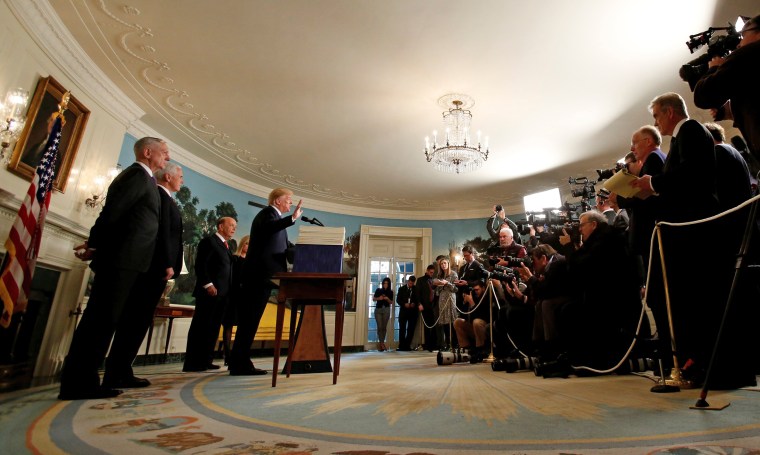News analysis
WASHINGTON — President Donald Trump lost — bigly — when Congress voted for a $1.3 trillion spending bill that repudiates many of his top policy goals and much of his rhetoric.
He didn't get the money he wanted for a wall on the U.S. border with Mexico or a provision cutting off federal funds for "sanctuary cities." Lawmakers not only ignored his fiscal 2018 budget's elimination of scores of federal programs, they increased spending for many of those on his target list. And Congress provided seed cash for a New York-New Jersey tunnel project that Trump tried to kill.
The list of ways in which Congress rejected Trump's priorities — save a massive buildup in defense spending — is nearly as long as the 2,232-page bill that policy wonks are still studying.
More stunning, perhaps, was the way Republicans and Democrats both teamed up to cross out items on Trump's wish list. Almost exactly three-fifths of each party's caucus in the House voted for the so-called omnibus spending bill Thursday, while in the Senate 39 Democrats, 25 Republicans and one independent — Sen. Angus King of Maine — voted for it early Friday morning.
Perhaps that helps explain why, after White House officials and congressional Republican leaders swore up and down this week that Trump would sign the bill, he tweeted Friday morning that he was "considering a VETO" of it.
Trump found himself in a lose-lose political box: accept a bill palatable to most Democrats and Republicans but not his base — or reject it, and risk more serious political damage by taking an extreme position at a time when his party is facing a tough electoral battlefield for control of the House.
That is: Things turned out badly for him. But by vetoing a bill that had such broad, bipartisan support, he could have made things even worse.
So, grudgingly, he announced at the White House Friday afternoon that he would bless it — even as he declared he would “never sign another bill like this again.”
“I was thinking about doing the veto,” he said. “But because of the incredible gains that we’ve been able to make for the military, that overrode any of our thinking.”
Trump left GOP leaders no choice but to write legislation that would attract Democratic votes while irritating the president and alienating GOP hard-liners — a model that is likely to stick if Trump can't either unify the Republican Party on legislative items or find ways to lure moderate Democrats away from their own leaders.
"President Trump has done little or nothing to consistently build relationships across party lines — or the tools necessary to pressure Democrats, even in red states," said Michael Steel, a former House Republican leadership aide. "Plus, he hasn’t been willing or able to get votes from recalcitrant conservative Republicans to pass bills on a party line vote, and avoid going to Democrats for their support. As a result, bipartisan support is necessary for a ‘must-pass’ bill, and the president doesn’t always get his way."
Related: Trump signs spending bill — tells Congress never again
Trump was ambivalent enough about the outcome earlier this week that House Speaker Paul Ryan, R-Wis., and Senate Majority Leader Mitch McConnell, R-Ky., had to remind him of what he'd gained in military spending — and why he'd had to give ground on other policies — before he seemed to endorse the bill publicly.
"They had a good conversation about the wins delivered for the president, and [Trump] is supportive of the bill," Ryan spokeswoman AshLee Strong said Wednesday when it was reported that her boss had an unannounced meeting with the president. White House Press Secretary Sarah Sanders issued a similar statement. And, hours later, Trump declared his position on Twitter.
As Trump pointed out, the bill contains a relatively small bump in funding for border security. But Democrats wouldn't sign off on substantial money for an actual wall after they couldn't come to an agreement with the White House over a permanent halt to the deportation of undocumented immigrants who were brought to the country illegally as children.
"It is troubling when we get a tunnel and we don’t get a wall," Rep. Mark Meadows, R-N.C., the chairman of the conservative Freedom Caucus, said when details of the bill were first made public.
And even as Vice President Mike Pence touted the bill as a victory for Trumpism during a stop in Manchester, N.H., on Thursday, he noted that it was "hardly perfect" and that it would allow a president who had vowed to make Mexico pay for a border barrier "start" to build the wall.
House Minority Leader Nancy Pelosi, D-Calif., who negotiated the final details of the measure with Ryan, McConnell and Senate Minority Leader Chuck Schumer, D-N.Y., said she's perfectly fine with Trump's claiming victory on the wall.
"If you want to think you're getting a wall, you just think it and sign the bill," she said before voting for it.
If the White House and Republicans on Capitol Hill had their druthers, Pelosi's backing wouldn't be necessary to keep the government running. After all, they've shaped their midterm campaign strategy around telling voters she's too extreme for the country.
But Republicans are divided enough that GOP leaders needed Democrats to govern, which gave the opposition enough leverage to block many of Trump's top policy goals. And that, in turn, clearly infuriated Trump.
Kenneth Baer, a former associate director of the White House Office of Management and Budget under President Barack Obama, cast the whole situation as a major political failure for the GOP.
"In a world in which one party controls both houses of Congress and the presidency, you'd expect that the president would get a vast majority of his budget priorities," Baer said. "The fact that he did not is a sign of how out of step Trump is from congressional Republicans, how incompetent his White House is — or both."
